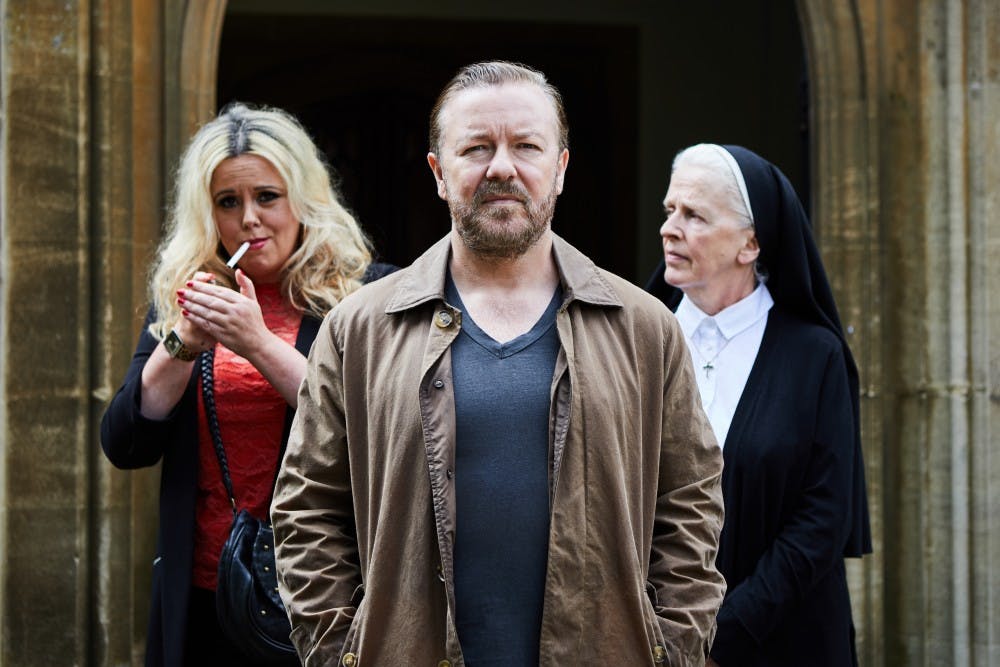Comedian Ricky Gervais has always been a controversial figure. His typical brand of humor is mocking, and can come across as insulting. In hosting the Golden Globes on four separate occasions, he consistently received hotly mixed reviews, seeing as his performance was largely based on the ridicule of many of the celebrities in the audience. However, his routines can also be sharp and hilariously relatable rather than mean—sometimes. Unfortunately, his newest Netflix Original After Life, released on March 8, crystallizes his resentful attitude, but without any of his redeeming wit.
Gervais has played David Brent in the British version of The Office, Dominic Badguy in Muppets Most Wanted, and done various stand–up performances, but the character of Tony in After Life is his the darkest role yet. The show is centered around his wife's death and and his attempts at coping with this life–altering event. The question is: How can Gervais make this dark subject funny? His answer appears to be completely unrelated to the topic of the show. The show, which he wrote and directed, is a platform for him to indulge in his self–absorption. Tony almost never stops talking about himself and his loss. The purpose of the other characters is not to have their own lives, but rather, to give Tony fodder for his cynicism or to tell him that he's a decent person, although it's unclear how anyone could arrive at that conclusion. Homemade videos of him and his wife before her cancer are meant to be cute and display his more fun–loving side, but they instead just made me realize that I would want to divorce him. I don’t think anyone would want a husband that wakes you up to a foghorn several times, or pours water on them while asleep.

Photo by: Natalie Seery / Netflix
The show also serves as a venue for Gervais to tell his critics off. This appears to be a theme with which he has become increasingly concerned. His stand–up special Humanity in 2018 was largely dedicated to anecdotes about some of the tweets that had berated him for some of his more contested positions, such as his loudly self–proclaimed atheism. Humanity, however, was a great routine in which he simultaneously makes fun of some of his more extreme critics while also poking fun at his own childish need to respond. In After Life, he also dedicates long bits to some of his twitter critics, which can be seen in his lecture on atheism and his condemnation of the stand–up comedian he watches one night after work. Here, however, his mockery is crude and cheap, relying too heavily on mean jokes about his overweight coworker and on the shock factor of vulgar swear words. It’s like watching a spoiled bully get rewarded with candy.
In interviews, Gervais says that the show is meant to be liberating. Viewers can live vicariously through the character of Tony, who vocalizes the annoyances of everyday life rather than "biting his tongue." There is some merit to this argument—it’s funny to see Tony rebuke the waitress who refuses to serve him anything on the kid’s menu. But these moments are few and far between, and the satisfaction is diminished by the petulance of the character. It might be liberating to see a quick jibe at the waitress’s refusal, but it sours quickly when the jibe essentially turns into Tony childishly asking “Why? Why?” again and again.
At the outset of the show, people wondered how Gervais would use his renowned humor to discuss the existential crisis of a widower. The answer, though, is that he didn’t. He had all the tools to do so, with a fantastic comedic cast and his highest budget yet, but he could not properly execute the material in the format of a deadpan show. I’m still a Gervais fan, but After Life just validated the complaints of his critics.







